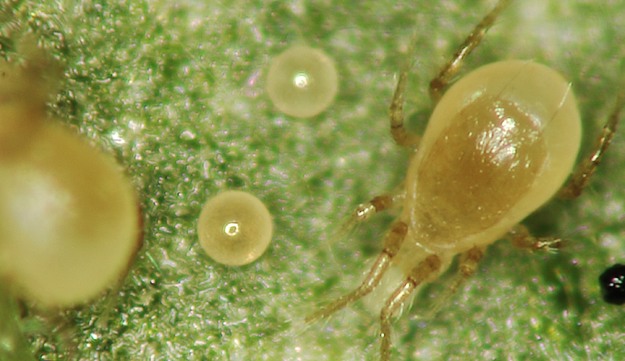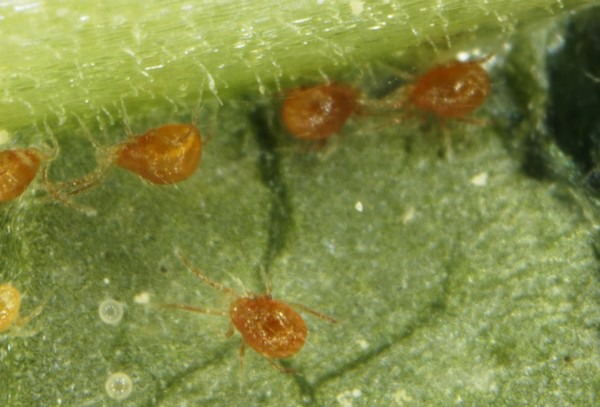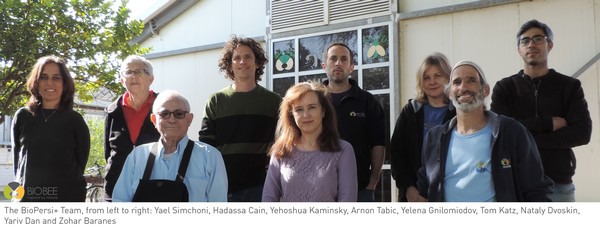Going against all odds the scientific literature and decades of practical recorded experience, a BioBee Sde Eliyahu R&D team, headed by R&D Entomologists Arnon Tabic and Tom Katz developed a new technology for the predatory mite Phytoseiulus persimilis.
P. persimilis is a remarkably effective predator that has been used successfully in Integrated Pest Management (IPM) programs since the 1960’s. The traditional rearing method is very successful and allowed BioBee, as well as other companies involved in the mass rearing of beneficial mites and insects, to produce large quantities of P. persimilis for over 40 years.
However, it also has many limitations. In the course of the years there were numerous attempts to commercially rear P. persimilis more efficiently, without or with very limited success. During the last few years BioBee’s dedicated R&D department worked arduously to develop, fine tune and calibrate the technological breakthrough process, which brought forth a revolutionary rearing method in the field of biological control. By mid-2020, BioBee started the industrial scale production.

“This new patented production method is a groundbreaking innovation,” explains Ran Gan El, CEO of BioBee Sde Eliyahu “BioBee’s new production method is a game changer for the whole biological control industry,” he added.
“The innovative rearing method allows for efficient, consistent and dependable production of P. persimilis, regardless of weather conditions. The scalability of the method is another advantage,” adds Arnon Tabic.
The new rearing technology yielded the BioPersi+, an improved version over the traditional BioPersimilis (Phytoseiulus persimilis) in many respects.
Traditional P. persimilis products are based on behavioral manipulation: the predatory mite is starved (at least partially) prior to harvest. As a result, it takes longer for the predatory mites to establish and start reproducing. The new product BioPersi+, arrives satiated and physiologically stronger, thus able to seek and control hot spots faster and start laying eggs on the same day of application in the field.
Another important difference is the age structure of the population. Whereas the traditional BioPersimilis product contains mainly adults, BioPersi+ product contains all the developmental stages of the mite (adults, juveniles and eggs). This diversity creates a continuity of active mites in the fields, assuring longer, uninterrupted spider mite control.
Compared to the traditional BioPersimilis, which appears as a shiny red-orange mite, BioPersi+ is white upon arrival. Yet it turns red-orange once it starts feeding on spider mites. This change in color offers proof of predation, an advantageous and unique visual indication to the grower.

“Years of development of the BioPersi+ technology, from the rough idea to the final product, taught me the great value of creative thinking and the persistent determination that was needed to tackle and overcome numerous technical and biological hurdles along the way” says Dr. Shimon Steinberg, BioBee’s Chief Scientific Officer. “This technology is a rare case of none-obviousness. It has created something against all odds. I’m proud and thrilled that the R&D team at BioBee has successfully exercised these values and finally reached this unprecedented achievement.”
To growers throughout the world, the new BioPersi+ addition to the arsenal of natural enemies, means more effective, efficient and longer lasting control of spider mites. Additionally, although slow-release products of generalist predatory mites, such as sachets, have been available for some time, no such product was possible with P. persimilis. BioBee’s new technology makes the slow-release option of P. persimilis feasible. The BioPersi+ slow-release products are expected to be launched by mid-2021.
“I think a revolutionary invention, such as BioPersi+, occurs very rarely in our business, perhaps once every ten years. I am grateful for the opportunity to be part of the team that delivers this product to the market and discovers the best possible uses for it. I am confident that it will meet and even exceed our customer’s expectations!”, adds Shachar Carmi Marketing and Business Development VP at BioBee.
At the threshold of 2021, BioBee is proud to deliver a message of innovation to the field of biological control.
For more information:
Biobee
Sde Eliyaho, 1081000, Israel
Tel: +972-4-6096907
www.biobee.com
